Plato's Apology and Phaedo Essay
VerifiedAdded on 2019/09/23
|6
|1654
|162
Essay
AI Summary
This essay delves into a comparative analysis of Plato's dialogues, 'Apology' and 'Phaedo,' focusing on the philosophical perspectives presented by Socrates. The essay explores the 'Theory of Forms' introduced in 'Phaedo,' which contrasts the material world with the realm of ideas. It examines Socrates' views on the immortality of the soul and the nature of knowledge, as presented in 'Phaedo,' and contrasts them with his defense in 'Apology,' where he claims to know nothing. The essay argues that while 'Phaedo' presents Socrates as a philosopher with profound knowledge, 'Apology' portrays him as someone who recognizes the limits of human understanding. The essay concludes that the two dialogues present different perspectives on Socrates' philosophical views, suggesting a possible evolution in his thinking.
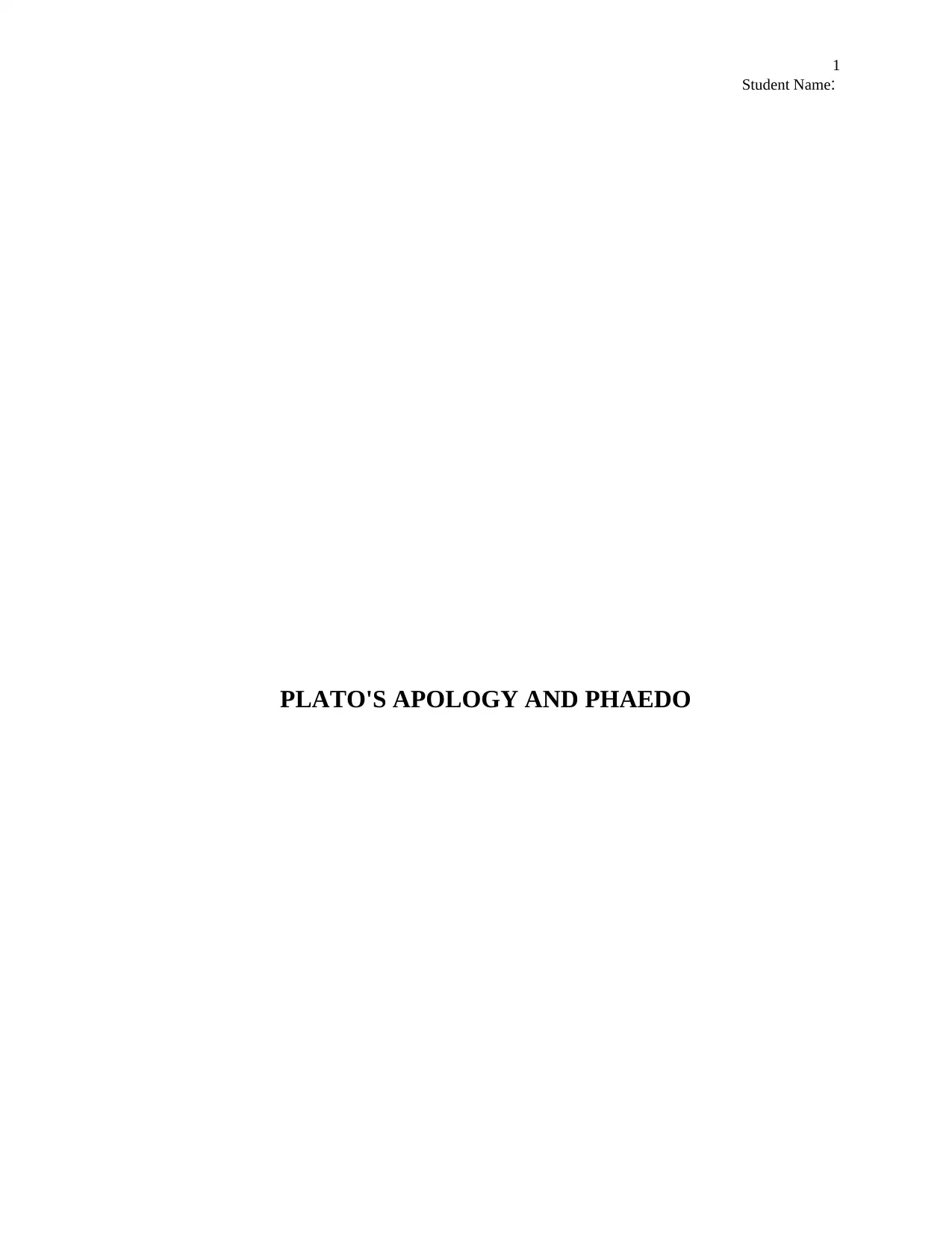
1
Student Name:
PLATO'S APOLOGY AND PHAEDO
Student Name:
PLATO'S APOLOGY AND PHAEDO
Paraphrase This Document
Need a fresh take? Get an instant paraphrase of this document with our AI Paraphraser
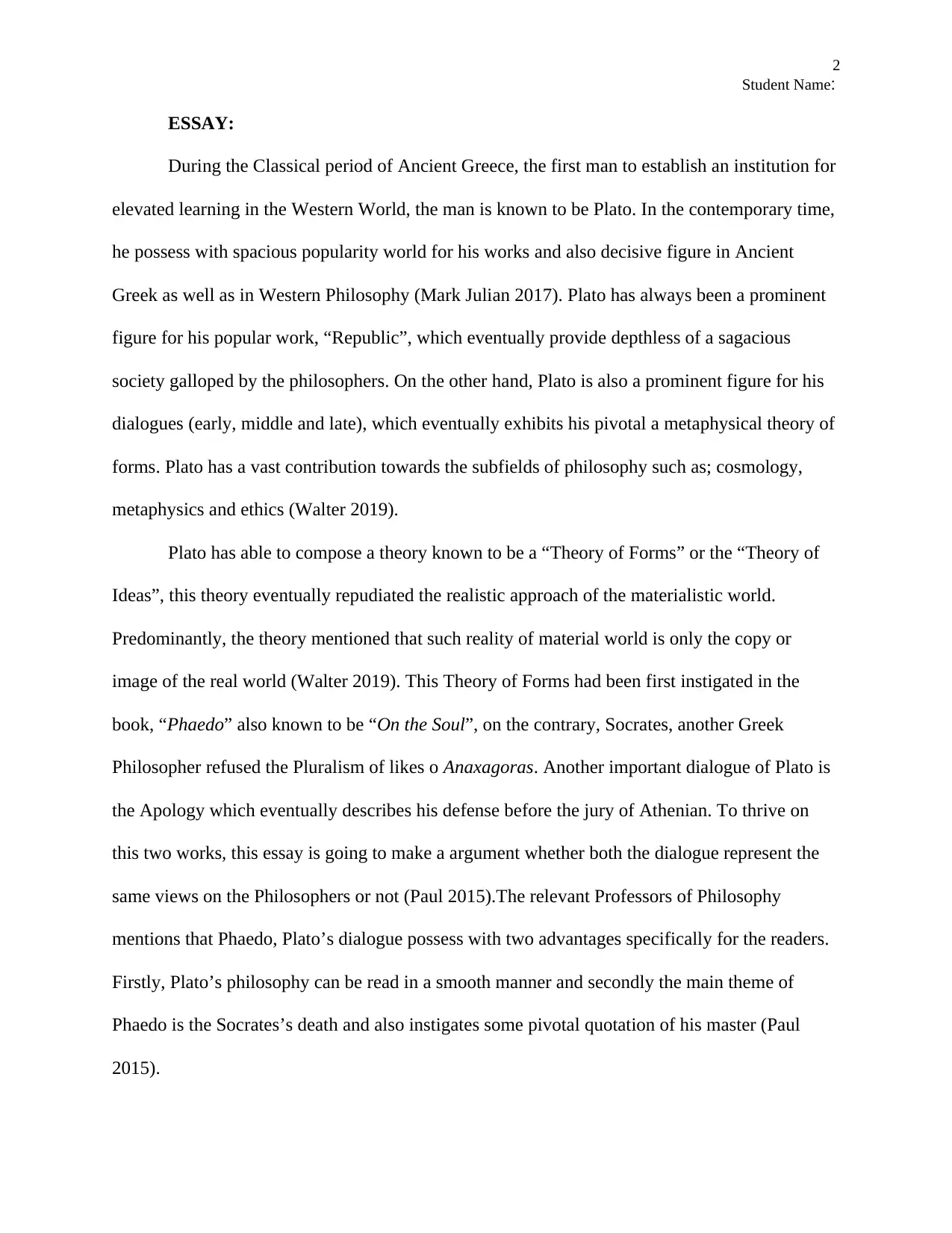
2
Student Name:
ESSAY:
During the Classical period of Ancient Greece, the first man to establish an institution for
elevated learning in the Western World, the man is known to be Plato. In the contemporary time,
he possess with spacious popularity world for his works and also decisive figure in Ancient
Greek as well as in Western Philosophy (Mark Julian 2017). Plato has always been a prominent
figure for his popular work, “Republic”, which eventually provide depthless of a sagacious
society galloped by the philosophers. On the other hand, Plato is also a prominent figure for his
dialogues (early, middle and late), which eventually exhibits his pivotal a metaphysical theory of
forms. Plato has a vast contribution towards the subfields of philosophy such as; cosmology,
metaphysics and ethics (Walter 2019).
Plato has able to compose a theory known to be a “Theory of Forms” or the “Theory of
Ideas”, this theory eventually repudiated the realistic approach of the materialistic world.
Predominantly, the theory mentioned that such reality of material world is only the copy or
image of the real world (Walter 2019). This Theory of Forms had been first instigated in the
book, “Phaedo” also known to be “On the Soul”, on the contrary, Socrates, another Greek
Philosopher refused the Pluralism of likes o Anaxagoras. Another important dialogue of Plato is
the Apology which eventually describes his defense before the jury of Athenian. To thrive on
this two works, this essay is going to make a argument whether both the dialogue represent the
same views on the Philosophers or not (Paul 2015).The relevant Professors of Philosophy
mentions that Phaedo, Plato’s dialogue possess with two advantages specifically for the readers.
Firstly, Plato’s philosophy can be read in a smooth manner and secondly the main theme of
Phaedo is the Socrates’s death and also instigates some pivotal quotation of his master (Paul
2015).
Student Name:
ESSAY:
During the Classical period of Ancient Greece, the first man to establish an institution for
elevated learning in the Western World, the man is known to be Plato. In the contemporary time,
he possess with spacious popularity world for his works and also decisive figure in Ancient
Greek as well as in Western Philosophy (Mark Julian 2017). Plato has always been a prominent
figure for his popular work, “Republic”, which eventually provide depthless of a sagacious
society galloped by the philosophers. On the other hand, Plato is also a prominent figure for his
dialogues (early, middle and late), which eventually exhibits his pivotal a metaphysical theory of
forms. Plato has a vast contribution towards the subfields of philosophy such as; cosmology,
metaphysics and ethics (Walter 2019).
Plato has able to compose a theory known to be a “Theory of Forms” or the “Theory of
Ideas”, this theory eventually repudiated the realistic approach of the materialistic world.
Predominantly, the theory mentioned that such reality of material world is only the copy or
image of the real world (Walter 2019). This Theory of Forms had been first instigated in the
book, “Phaedo” also known to be “On the Soul”, on the contrary, Socrates, another Greek
Philosopher refused the Pluralism of likes o Anaxagoras. Another important dialogue of Plato is
the Apology which eventually describes his defense before the jury of Athenian. To thrive on
this two works, this essay is going to make a argument whether both the dialogue represent the
same views on the Philosophers or not (Paul 2015).The relevant Professors of Philosophy
mentions that Phaedo, Plato’s dialogue possess with two advantages specifically for the readers.
Firstly, Plato’s philosophy can be read in a smooth manner and secondly the main theme of
Phaedo is the Socrates’s death and also instigates some pivotal quotation of his master (Paul
2015).
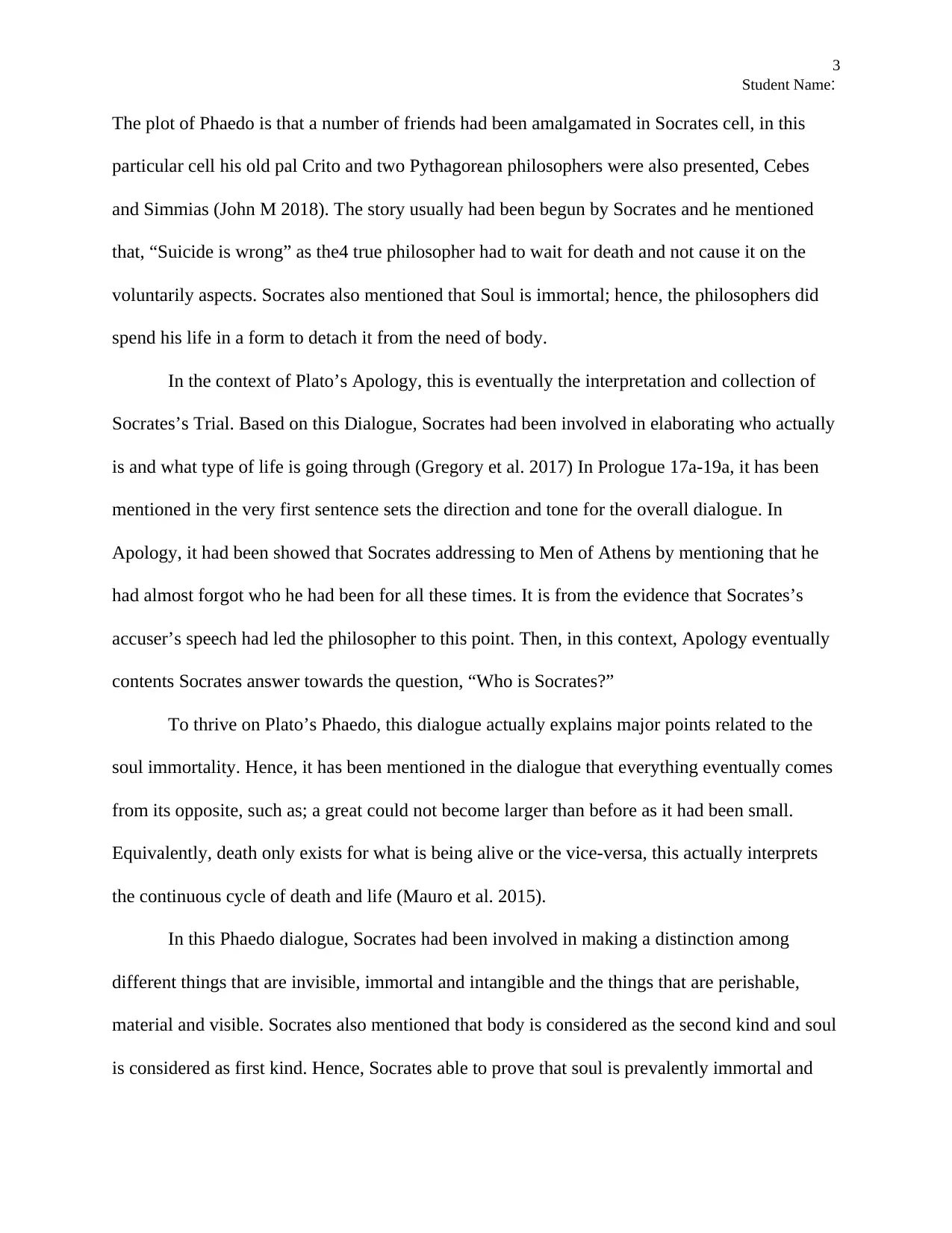
3
Student Name:
The plot of Phaedo is that a number of friends had been amalgamated in Socrates cell, in this
particular cell his old pal Crito and two Pythagorean philosophers were also presented, Cebes
and Simmias (John M 2018). The story usually had been begun by Socrates and he mentioned
that, “Suicide is wrong” as the4 true philosopher had to wait for death and not cause it on the
voluntarily aspects. Socrates also mentioned that Soul is immortal; hence, the philosophers did
spend his life in a form to detach it from the need of body.
In the context of Plato’s Apology, this is eventually the interpretation and collection of
Socrates’s Trial. Based on this Dialogue, Socrates had been involved in elaborating who actually
is and what type of life is going through (Gregory et al. 2017) In Prologue 17a-19a, it has been
mentioned in the very first sentence sets the direction and tone for the overall dialogue. In
Apology, it had been showed that Socrates addressing to Men of Athens by mentioning that he
had almost forgot who he had been for all these times. It is from the evidence that Socrates’s
accuser’s speech had led the philosopher to this point. Then, in this context, Apology eventually
contents Socrates answer towards the question, “Who is Socrates?”
To thrive on Plato’s Phaedo, this dialogue actually explains major points related to the
soul immortality. Hence, it has been mentioned in the dialogue that everything eventually comes
from its opposite, such as; a great could not become larger than before as it had been small.
Equivalently, death only exists for what is being alive or the vice-versa, this actually interprets
the continuous cycle of death and life (Mauro et al. 2015).
In this Phaedo dialogue, Socrates had been involved in making a distinction among
different things that are invisible, immortal and intangible and the things that are perishable,
material and visible. Socrates also mentioned that body is considered as the second kind and soul
is considered as first kind. Hence, Socrates able to prove that soul is prevalently immortal and
Student Name:
The plot of Phaedo is that a number of friends had been amalgamated in Socrates cell, in this
particular cell his old pal Crito and two Pythagorean philosophers were also presented, Cebes
and Simmias (John M 2018). The story usually had been begun by Socrates and he mentioned
that, “Suicide is wrong” as the4 true philosopher had to wait for death and not cause it on the
voluntarily aspects. Socrates also mentioned that Soul is immortal; hence, the philosophers did
spend his life in a form to detach it from the need of body.
In the context of Plato’s Apology, this is eventually the interpretation and collection of
Socrates’s Trial. Based on this Dialogue, Socrates had been involved in elaborating who actually
is and what type of life is going through (Gregory et al. 2017) In Prologue 17a-19a, it has been
mentioned in the very first sentence sets the direction and tone for the overall dialogue. In
Apology, it had been showed that Socrates addressing to Men of Athens by mentioning that he
had almost forgot who he had been for all these times. It is from the evidence that Socrates’s
accuser’s speech had led the philosopher to this point. Then, in this context, Apology eventually
contents Socrates answer towards the question, “Who is Socrates?”
To thrive on Plato’s Phaedo, this dialogue actually explains major points related to the
soul immortality. Hence, it has been mentioned in the dialogue that everything eventually comes
from its opposite, such as; a great could not become larger than before as it had been small.
Equivalently, death only exists for what is being alive or the vice-versa, this actually interprets
the continuous cycle of death and life (Mauro et al. 2015).
In this Phaedo dialogue, Socrates had been involved in making a distinction among
different things that are invisible, immortal and intangible and the things that are perishable,
material and visible. Socrates also mentioned that body is considered as the second kind and soul
is considered as first kind. Hence, Socrates able to prove that soul is prevalently immortal and
⊘ This is a preview!⊘
Do you want full access?
Subscribe today to unlock all pages.

Trusted by 1+ million students worldwide
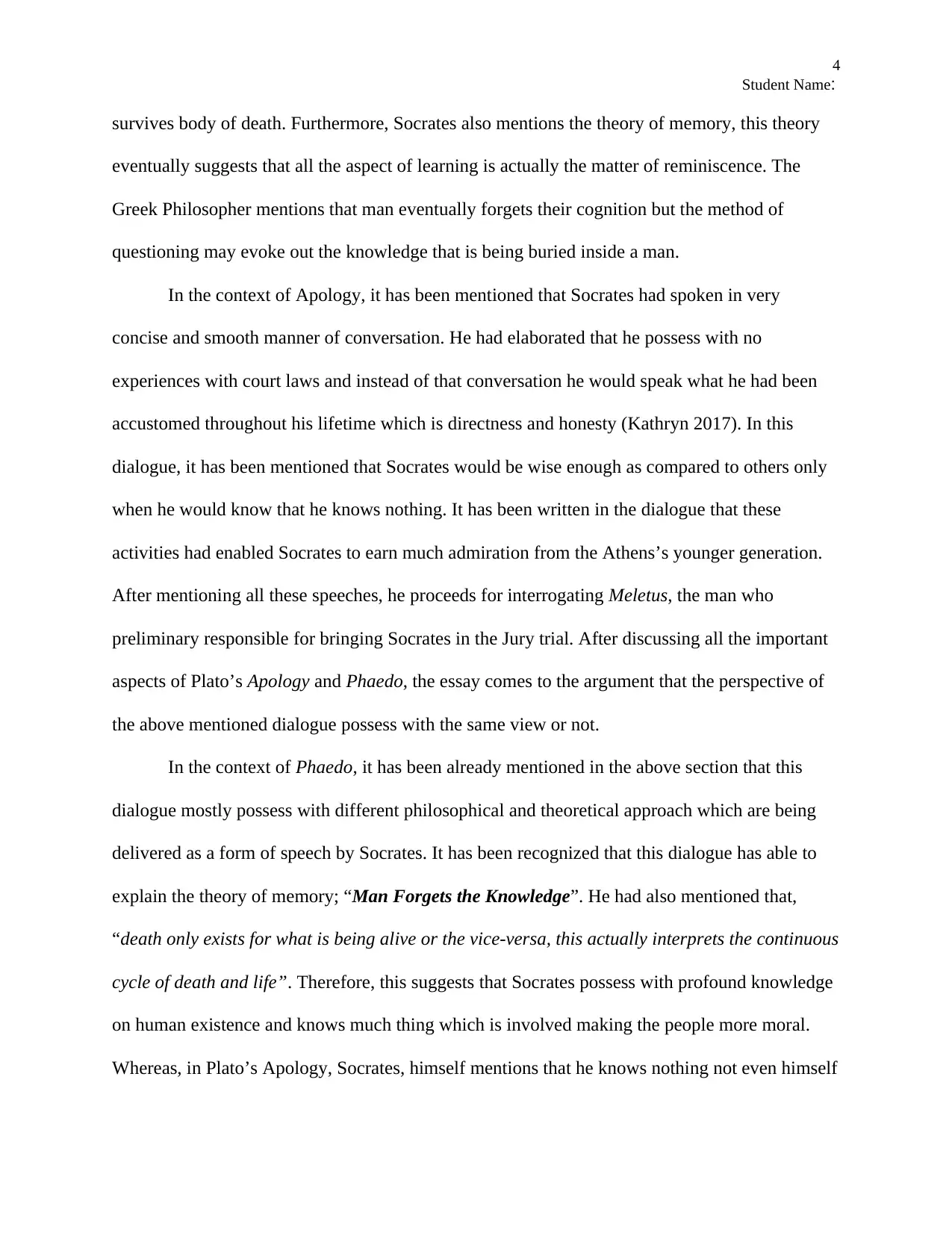
4
Student Name:
survives body of death. Furthermore, Socrates also mentions the theory of memory, this theory
eventually suggests that all the aspect of learning is actually the matter of reminiscence. The
Greek Philosopher mentions that man eventually forgets their cognition but the method of
questioning may evoke out the knowledge that is being buried inside a man.
In the context of Apology, it has been mentioned that Socrates had spoken in very
concise and smooth manner of conversation. He had elaborated that he possess with no
experiences with court laws and instead of that conversation he would speak what he had been
accustomed throughout his lifetime which is directness and honesty (Kathryn 2017). In this
dialogue, it has been mentioned that Socrates would be wise enough as compared to others only
when he would know that he knows nothing. It has been written in the dialogue that these
activities had enabled Socrates to earn much admiration from the Athens’s younger generation.
After mentioning all these speeches, he proceeds for interrogating Meletus, the man who
preliminary responsible for bringing Socrates in the Jury trial. After discussing all the important
aspects of Plato’s Apology and Phaedo, the essay comes to the argument that the perspective of
the above mentioned dialogue possess with the same view or not.
In the context of Phaedo, it has been already mentioned in the above section that this
dialogue mostly possess with different philosophical and theoretical approach which are being
delivered as a form of speech by Socrates. It has been recognized that this dialogue has able to
explain the theory of memory; “Man Forgets the Knowledge”. He had also mentioned that,
“death only exists for what is being alive or the vice-versa, this actually interprets the continuous
cycle of death and life”. Therefore, this suggests that Socrates possess with profound knowledge
on human existence and knows much thing which is involved making the people more moral.
Whereas, in Plato’s Apology, Socrates, himself mentions that he knows nothing not even himself
Student Name:
survives body of death. Furthermore, Socrates also mentions the theory of memory, this theory
eventually suggests that all the aspect of learning is actually the matter of reminiscence. The
Greek Philosopher mentions that man eventually forgets their cognition but the method of
questioning may evoke out the knowledge that is being buried inside a man.
In the context of Apology, it has been mentioned that Socrates had spoken in very
concise and smooth manner of conversation. He had elaborated that he possess with no
experiences with court laws and instead of that conversation he would speak what he had been
accustomed throughout his lifetime which is directness and honesty (Kathryn 2017). In this
dialogue, it has been mentioned that Socrates would be wise enough as compared to others only
when he would know that he knows nothing. It has been written in the dialogue that these
activities had enabled Socrates to earn much admiration from the Athens’s younger generation.
After mentioning all these speeches, he proceeds for interrogating Meletus, the man who
preliminary responsible for bringing Socrates in the Jury trial. After discussing all the important
aspects of Plato’s Apology and Phaedo, the essay comes to the argument that the perspective of
the above mentioned dialogue possess with the same view or not.
In the context of Phaedo, it has been already mentioned in the above section that this
dialogue mostly possess with different philosophical and theoretical approach which are being
delivered as a form of speech by Socrates. It has been recognized that this dialogue has able to
explain the theory of memory; “Man Forgets the Knowledge”. He had also mentioned that,
“death only exists for what is being alive or the vice-versa, this actually interprets the continuous
cycle of death and life”. Therefore, this suggests that Socrates possess with profound knowledge
on human existence and knows much thing which is involved making the people more moral.
Whereas, in Plato’s Apology, Socrates, himself mentions that he knows nothing not even himself
Paraphrase This Document
Need a fresh take? Get an instant paraphrase of this document with our AI Paraphraser
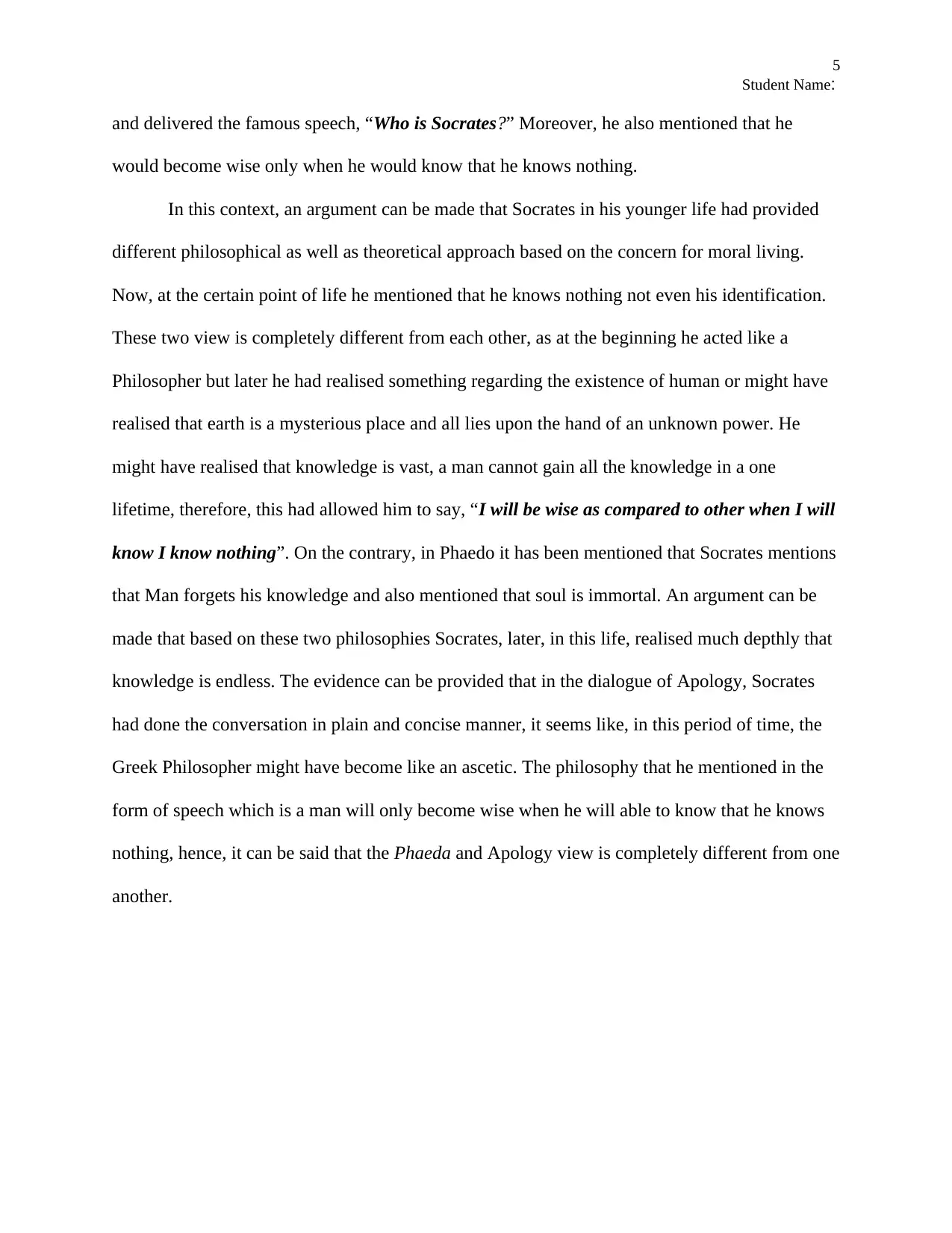
5
Student Name:
and delivered the famous speech, “Who is Socrates?” Moreover, he also mentioned that he
would become wise only when he would know that he knows nothing.
In this context, an argument can be made that Socrates in his younger life had provided
different philosophical as well as theoretical approach based on the concern for moral living.
Now, at the certain point of life he mentioned that he knows nothing not even his identification.
These two view is completely different from each other, as at the beginning he acted like a
Philosopher but later he had realised something regarding the existence of human or might have
realised that earth is a mysterious place and all lies upon the hand of an unknown power. He
might have realised that knowledge is vast, a man cannot gain all the knowledge in a one
lifetime, therefore, this had allowed him to say, “I will be wise as compared to other when I will
know I know nothing”. On the contrary, in Phaedo it has been mentioned that Socrates mentions
that Man forgets his knowledge and also mentioned that soul is immortal. An argument can be
made that based on these two philosophies Socrates, later, in this life, realised much depthly that
knowledge is endless. The evidence can be provided that in the dialogue of Apology, Socrates
had done the conversation in plain and concise manner, it seems like, in this period of time, the
Greek Philosopher might have become like an ascetic. The philosophy that he mentioned in the
form of speech which is a man will only become wise when he will able to know that he knows
nothing, hence, it can be said that the Phaeda and Apology view is completely different from one
another.
Student Name:
and delivered the famous speech, “Who is Socrates?” Moreover, he also mentioned that he
would become wise only when he would know that he knows nothing.
In this context, an argument can be made that Socrates in his younger life had provided
different philosophical as well as theoretical approach based on the concern for moral living.
Now, at the certain point of life he mentioned that he knows nothing not even his identification.
These two view is completely different from each other, as at the beginning he acted like a
Philosopher but later he had realised something regarding the existence of human or might have
realised that earth is a mysterious place and all lies upon the hand of an unknown power. He
might have realised that knowledge is vast, a man cannot gain all the knowledge in a one
lifetime, therefore, this had allowed him to say, “I will be wise as compared to other when I will
know I know nothing”. On the contrary, in Phaedo it has been mentioned that Socrates mentions
that Man forgets his knowledge and also mentioned that soul is immortal. An argument can be
made that based on these two philosophies Socrates, later, in this life, realised much depthly that
knowledge is endless. The evidence can be provided that in the dialogue of Apology, Socrates
had done the conversation in plain and concise manner, it seems like, in this period of time, the
Greek Philosopher might have become like an ascetic. The philosophy that he mentioned in the
form of speech which is a man will only become wise when he will able to know that he knows
nothing, hence, it can be said that the Phaeda and Apology view is completely different from one
another.
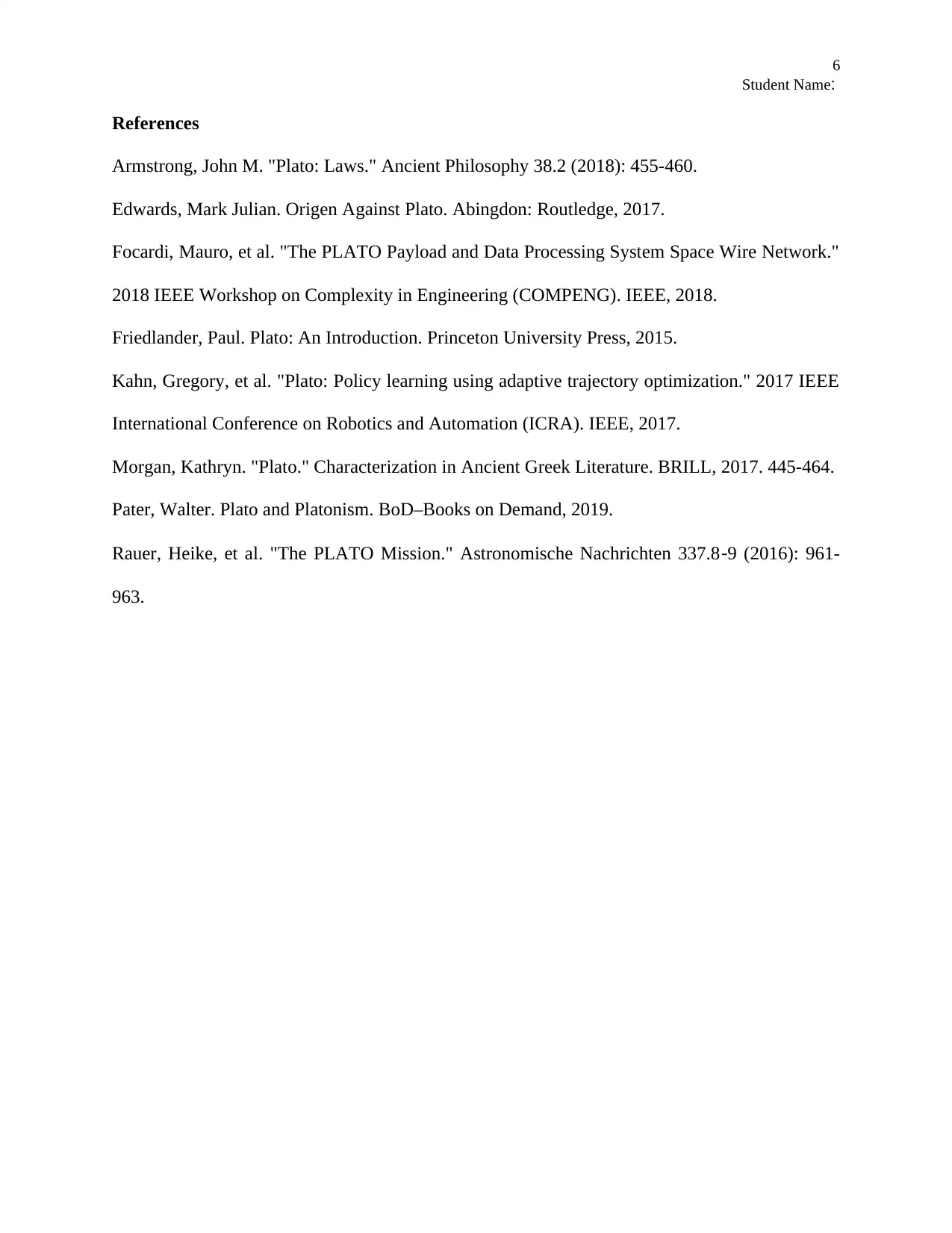
6
Student Name:
References
Armstrong, John M. "Plato: Laws." Ancient Philosophy 38.2 (2018): 455-460.
Edwards, Mark Julian. Origen Against Plato. Abingdon: Routledge, 2017.
Focardi, Mauro, et al. "The PLATO Payload and Data Processing System Space Wire Network."
2018 IEEE Workshop on Complexity in Engineering (COMPENG). IEEE, 2018.
Friedlander, Paul. Plato: An Introduction. Princeton University Press, 2015.
Kahn, Gregory, et al. "Plato: Policy learning using adaptive trajectory optimization." 2017 IEEE
International Conference on Robotics and Automation (ICRA). IEEE, 2017.
Morgan, Kathryn. "Plato." Characterization in Ancient Greek Literature. BRILL, 2017. 445-464.
Pater, Walter. Plato and Platonism. BoD–Books on Demand, 2019.
Rauer, Heike, et al. "The PLATO Mission." Astronomische Nachrichten 337.8‐9 (2016): 961-
963.
Student Name:
References
Armstrong, John M. "Plato: Laws." Ancient Philosophy 38.2 (2018): 455-460.
Edwards, Mark Julian. Origen Against Plato. Abingdon: Routledge, 2017.
Focardi, Mauro, et al. "The PLATO Payload and Data Processing System Space Wire Network."
2018 IEEE Workshop on Complexity in Engineering (COMPENG). IEEE, 2018.
Friedlander, Paul. Plato: An Introduction. Princeton University Press, 2015.
Kahn, Gregory, et al. "Plato: Policy learning using adaptive trajectory optimization." 2017 IEEE
International Conference on Robotics and Automation (ICRA). IEEE, 2017.
Morgan, Kathryn. "Plato." Characterization in Ancient Greek Literature. BRILL, 2017. 445-464.
Pater, Walter. Plato and Platonism. BoD–Books on Demand, 2019.
Rauer, Heike, et al. "The PLATO Mission." Astronomische Nachrichten 337.8‐9 (2016): 961-
963.
⊘ This is a preview!⊘
Do you want full access?
Subscribe today to unlock all pages.

Trusted by 1+ million students worldwide
1 out of 6
Your All-in-One AI-Powered Toolkit for Academic Success.
+13062052269
info@desklib.com
Available 24*7 on WhatsApp / Email
![[object Object]](/_next/static/media/star-bottom.7253800d.svg)
Unlock your academic potential
Copyright © 2020–2025 A2Z Services. All Rights Reserved. Developed and managed by ZUCOL.

